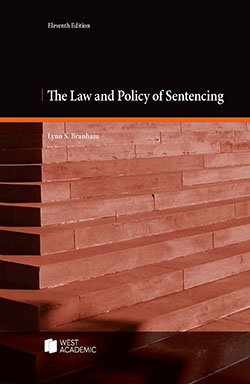- Home
- The Law and Policy of Sentencing
The Law and Policy of Sentencing
This leading casebook on sentencing law and policy includes cases, statutes, court rules, sentencing guidelines, professional standards, articles, information on other countries’ practices, a sample presentence investigation report, research findings, and questions designed to provoke lively debates. The book spans such topics as plea bargaining, rights during sentencing, aggravating and mitigating sentencing factors, community sentencing options, the death penalty, application of the Eighth Amendment in noncapital cases, back-end prison-release mechanisms, probation and parole revocation, and the enmeshed penalties (collateral consequences) that attend a conviction. Expanded or new coverage of provisions of the Model Penal Code: Sentencing, restorative justice, proposed reforms to plea bargaining and parole systems, sentences for crimes committed when a juvenile or “emerging adult,” and other subjects accentuates this book’s value on a core area of the law.
Imprint: West Academic Publishing
Series: American Casebook Series
Publication Date: 04/04/2025
Lynn S. Branham, University of Missouri-Columbia School of Law
CasebookPlus™
This title is available in our CasebookPlus format. CasebookPlus provides support beyond your classroom lectures and materials by offering additional digital resources to you and your students. Anchored by faculty-authored formative self-assessments keyed to our most popular casebooks, CasebookPlus allows students to test their understanding of core concepts as they are learning them in class – on their own, outside of the classroom, with no extra work on your part. CasebookPlus combines three important elements:
- A new print or digital casebook
- Access to a downloadable eBook with the ability to highlight and add notes
- 12-month access to a digital Learning Library complete with:
- Chapter questions keyed to the casebook
- Black Letter Law questions (available in select subjects)
- Subject area review questions for end of semester use
Leading digital study aids, an outline starter, and audio lectures in select subjects
Students can still utilize CasebookPlus digital resources if they’ve purchased a used book or are renting their text by purchasing the Learning Library at westacademic.com.
With CasebookPlus, you can customize your students’ learning experience and monitor their performance. The quiz editor allows you to create your own custom quiz set, suppress specific quiz questions or quiz sets, and time-release quiz questions. Additionally, the flexible, customized reporting capability helps you evaluate your students’ understanding of the material and can also help your school demonstrate compliance with the new ABA Assessment and Learning Outcomes standards.
The eleventh edition of this leading casebook on sentencing law and policy profiles many key developments since publication of the book’s last edition and expands its coverage of other subjects. The updates and revisions in the book include, among others:
- Recommendations, including those of the American Bar Association’s Plea Bargain Task Force, to revamp plea-bargaining policies and practices
- State ethics opinions finding it unethical for defense attorneys and prosecutors to negotiate plea agreements containing certain appellate waivers
- The inclusion of pertinent new Supreme Court cases and statutes, McCleskey v. Kemp (previously discussed in the notes) as a principal case, and updated statistics
- An article critiquing the current role of “prior record enhancements” (criminal history) when calculating a sentence
- The stance of the Model Penal Code: Sentencing on a range of sentencing-related issues
- Proposed changes in the law and its implementation to enhance probation’s capacity to meet sentencing goals
- State supreme court cases holding their state’s constitution provides more expansive rights at sentencing than the United States Constitution
- Augmented coverage of cases and policy developments bearing on the sentencing and release of people convicted of crimes committed when a juvenile or “emerging adult”
- An article describing the functioning of a federal reentry court
- The Model Penal Code: Sentencing’s criticisms of parole systems and sentencing experts’ recommendations to overhaul those systems if retained
Learn more about this series.
Access Denied
Law School Faculty - Sign in or Create an Account to access this content. Law faculty who have created an account can sign in after receiving email notification that registration has been approved. Email accountmanager@westacademic.com or call 800-313-9378 for assistance.
Other Higher Education Faculty who wish to access digital review copies or teaching resources should contact their West Academic Account Manager at college@westacademic.com or 800-360-9378.
Adopters Only
This content is intended for adopters only. Sign in or Create an Account to access this content. Law faculty who have created an account can sign in after receiving email notification that registration has been approved. If you are an adopter who is unable to access this content after signing in, contact your account manager for assistance at accountmanager@westacademic.com or call 800-313-9378 for assistance.
Access Denied
Sign in or Create an Account to access this content. Faculty who have created an account can sign in after receiving email notification that registration has been approved. Contact us for assistance.
Law School Faculty: email accountmanager@westacademic.com or call 800-313-9378.
Other Higher Education Faculty: email college@westacademic.com or 800-360-9378.
Access Denied
Higher education faculty who wish to view this document should contact their West Academic Account Manager at college@westacademic.com or 800-360-9378.
